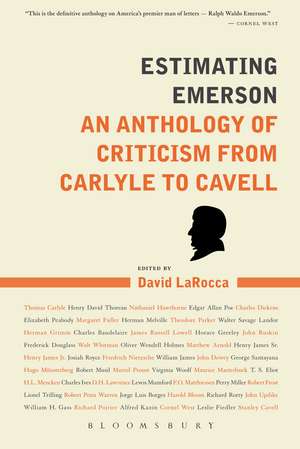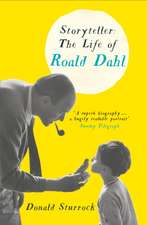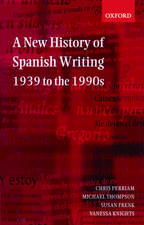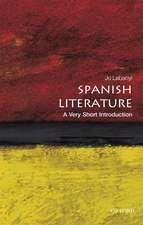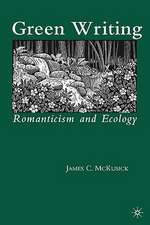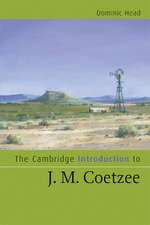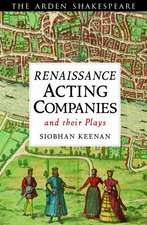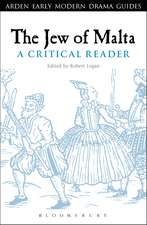Estimating Emerson: An Anthology of Criticism from Carlyle to Cavell
Editat de Dr. David LaRoccaen Limba Engleză Paperback – 27 feb 2013
Preț: 278.61 lei
Preț vechi: 312.11 lei
-11% Nou
Puncte Express: 418
Preț estimativ în valută:
53.31€ • 55.08$ • 44.35£
53.31€ • 55.08$ • 44.35£
Carte tipărită la comandă
Livrare economică 19 martie-02 aprilie
Preluare comenzi: 021 569.72.76
Specificații
ISBN-13: 9781441164865
ISBN-10: 1441164863
Pagini: 736
Dimensiuni: 152 x 229 x 56 mm
Greutate: 1.08 kg
Editura: Bloomsbury Publishing
Colecția Bloomsbury Academic
Locul publicării:New York, United States
ISBN-10: 1441164863
Pagini: 736
Dimensiuni: 152 x 229 x 56 mm
Greutate: 1.08 kg
Editura: Bloomsbury Publishing
Colecția Bloomsbury Academic
Locul publicării:New York, United States
Caracteristici
Over 170 years of critical commentary on Emerson in one well-edited and expertly annotated volume.
Notă biografică
David LaRocca (Ph.D Vanderbilt University) is Writer-in-Residence in the Frederick Lewis Allen Room at the New York Public Library, USA, and Coordinating Producer and Consulting Editor for the ongoing documentary film project The Intellectual Portrait Series. He studied philosophy, film, rhetoric, and religion at SUNY-Buffalo, UC Berkeley, Vanderbilt University, and at Harvard University, where he was Sinclair Kennedy Traveling Fellow in the United Kingdom. Author of On Emerson (2003) and editor of Stanley Cavell's book Emerson's Transcendental Etudes (2003), he writes regularly on topics in aesthetics, literary theory, and film. His essays have been published in volumes such as Nietzsche e L'America (2005), New Morning: Emerson in the Twenty-first Century (2008) and Emerson for the Twenty-First Century (2010).
Cuprins
INTRODUCTION1840-1860 THOMAS CARLYLE Preface by the English Editor to Essays: First Series HENRY DAVID THOREAU Letter from Thoreau to Emerson NATHANIEL HAWTHORNE Selected Letters EDGAR ALLAN POE R. W. EmersonCHARLES DICKENS Boston ELIZABETH PALMER PEABODY Nature, A Prose PoemORESTES AUGUSTUS BROWNSON Nature; Emerson's Essays; On the Divinity School Address ANDREWS NORTON A Discourse on the Latest Form of Infidelity WILLIAM HENRY CHANNING Emerson's Phi Beta Kappa Oration MARGARET FULLER Essays: Second Series AMOS BRONSON ALCOTT Essays ELIZABETH BARRETT BROWNING Stanzas Occasioned by a Passage in Mr. Emerson's Journal, Which States, That on The Mention of Lord Byron's Name, Captain Demetrius, An Old Roumeliot Burst Into Tears THEODORE PARKER The Writings of Ralph Waldo Emerson1861-1880 MATTHEW ARNOLD Written in Emerson's Essays (Sonnet); Emerson CHARLES BAUDELAIRE My Heart Laid Bare JOHN GREENLEAF WHITTIER Emerson's Birthday AMES RUSSELL LOWELL Emerson the Lecturer; Mr. Emerson's New Course of Lectures; The Conduct of LifeOLIVER WENDELL HOLMES A Tribute on the Occasion of Emerson's DeathCHARLES WILLIAM ELIOT Emerson HORACE GREELEY Letters from Greeley to Thoreau about Emerson WALT WHITMAN How I Still Get Around and Take Notes (No. 5); Emerson's Books (the Shadows of Them); The Superiority of Emerson; By Emerson's Grave; And selected letters \HERMAN MELVILLE Selections from Correspondence, and Miscellaneous Notes 1881-1900 HENRY JAMES, SR. Mr. Emerson HENRY JAMES, JR. Emerson and His Age; Emerson; Carlyle and Emerson WILLIAM JAMES Address at the Emerson Centenary in Concord JOHN JAY CHAPMAN Emerson FRIEDRICH NIETZSCHE Selected Letters and Passages on Emerson 1901-1920 D. H. LAWRENCE Americans JOSIAH ROYCE Selected Letters; The Decay of Earnestness JOHN DEWEY Ralph Waldo EmersonGEORGE SANTAYANA EmersonROBERT MUSIL Selections from Diaries MARCEL PROUST Selected Mottos and Letters, and Excerpts from NovelsMAURICE MAETERLINCK Emerson (from On Emerson and other essays)CHARLES IVES Essays before a Sonata (Emerson) 1921-1940 VIRGINIA WOOLF Emerson's Journals T. S. ELIOT "Cousin Nancy" and "Sweeney Erect" [poems]; Selections from Letters; Clark Lecture, CambridgeF. O. MATTHIESSEN In the Optative Mood 1941-1960 ROBERT FROST On Emerson JORGE LUIS BORGES Emerson; Selections from Conversations with Jorge Luis Borges 1961-1980 JOSEPH BLAU Emerson's Transcendentalist Individualism as a Social Philosophy PERRY MILLER From Edwards to Emerson; Emersonian Genius and the American Democracy1981-present JOHN UPDIKE Emersonianism; Big Dead White Male WILLIAM GASS Emerson and the essay RICHARD POIRIER The Question of Genius JOHN J. MCDERMOTT Spires of Influence: The Importance of Emerson for Classical American Philosophy RICHARD RORTY Pragmatism as Romantic Polytheism; Professionalized Philosophy and Transcendentalist Culture HAROLD BLOOM Mr. America; The Freshness of Transformation: Emerson's Dialectics of Influence CORNEL WEST The Emersonian Prehistory of American Pragmatism STANLEY CAVELL Thinking of Emerson; An Emerson Mood; Emerson [chapter 1 of Cities of Words] LIST OF SOURCES INDEX
Recenzii
This is the definitive anthology on America's premier man of letters-Ralph Waldo Emerson.
Quite apart from the usefulness of having all these important essays handy, readers may also toy with this simple question: when writing about a writer's work, over the years, have critics gotten better or have they gotten worse?
David LaRocca's Estimating Emerson is an essential anthology of criticism. Every lover of Emerson will be tempted to read deeply in this volume, which offers a rich spectrum of reactions to the Emersonian genius, from Emerson's own day to the present. It's not just a delightful book, but a necessary one.
LaRocca's anthology, Estimating Emerson, offers a unique invitation to essential knowledge for anybody interested in America's sense of itself for the better part of the last two centuries. In our literary and philosophical culture Emerson's writings and reputation have cast the longest shadow. How Emerson is perceived amounts to the most direct route to who we are or who we wish, or seem, to be. Even those who want to reject Emerson's legacy will welcome this volume since it gathers a decisive quorum of the most significant anti-Emersonian voices as well as the most enthusiastic and the most discerning. The inheritability of this unavoidable patrimony poses challenges of reading not only Emerson's remarkable writing. It also entails reading the writing of his remarkable readers who have created many memorable versions of the so-called sage or Lucifer of Concord, depending on whom you consult-Poe or Hawthorne, Updike or Cavell, among many others. LaRocca has gathered together the most comprehensive one-volume collection of first-rate writers responding to Emerson since such reckonings became necessary.
This is a GREAT idea, and it is amazing to me that no such book already exists! It is a much needed anthology, and will be welcome for those who want to get a sense, in a single volume, of the breadth and profundity of Emerson's influence over the last 170 years, and also to defamliarize the 'Sage of Concord' as an exclusively New England personage. The writings LaRocca has assembled here show what an international figure Emerson was. Anybody who cares about literature on any level ought to be struck by, and interested in, this.
I find it especially valuable that LaRocca has chosen a wide array of writers within and outside U.S. borders. Now that the humanities are going global, it is especially timely to foreground the transnational connections between American writers (whether canonical or not) and writers beyond its borders. In this sense, it is obvious that LaRocca knows Emerson criticism in depth: not only has he selected these essays using a convincing criterion about Emerson's relevance in the English-speaking world (which is the subject of the 1834-60 section); he has also constructed a volume that speaks for Emerson's importance beyond the American background (the rest of the sections include essays by Lawrence, Proust, Musil, Maeterlinck, Borges, etc.). In addition, some of the essays in the collection--such as those by Elizabeth Peabody, Amos Bronson Alcott, Robert Frost or Harold Bloom (especially "Mr. America")-are very hard to find today, which makes this collection is an invaluable tool for anyone interested not only in Emerson scholarship but in the literary culture of the American Renaissance in general.
I cannot think of a more useful and necessary resource for reading about and especially teaching Emerson's complex but crucial essays than Estimating Emerson: An Anthology of Criticism from Carlyle to Cavell.
LaRocca's Estimating Emerson: An Anthology of Criticism from Carlyle to Cavell is both very exciting and sorely needed. The pieces selected for inclusion, as many know, are all scattered hither and yon, and have been reproduced only intermittently or not at all. Yet together they would be a valuable resource for scholars, their students, and other readers of Emerson interested in his reception over the decades. In fact, the question of Emerson's reception-as for his close reader Nietzsche-is perhaps the question in assessing this writer's achievement and in coming to see what demands he places on his own writing and on the act of reading. I see LaRocca's anthology as helping to reveal to readers the power of Emerson's prose-not only on the page but for its first auditors; not only for those who knew Emerson as a neighbor but for those meeting his prose from across the Atlantic, even in translation. The organization of the volume, divided by consecutive scores of years, shows the astonishingly consistent engagement with Emerson since his own day, even as individual writers clash in their views across and even within the decades. Estimating Emerson looks to be an anthology that easily will find a place in the classroom for courses in American literature, American studies, and American philosophy.
This is one well-condensed and skillfully explained volume with more than 170 years of analytical commentary on Emerson. Given their illustrious intellectual pedigrees and histories of influence, 67 writers have composed work on Emerson: not just any writers, but some of the finest and most celebrated contributors to prose in the last few centuries. [...] Estimating Emerson reveals a long, but not exhaustive span from classical to contemporary views, which are not only from America, but also Great Britain, Europe and Latin America. The absolute magnitude and miscellany of comments creates a kind of consensus, across time, of Emerson's enduring significance.
Quite apart from the usefulness of having all these important essays handy, readers may also toy with this simple question: when writing about a writer's work, over the years, have critics gotten better or have they gotten worse?
David LaRocca's Estimating Emerson is an essential anthology of criticism. Every lover of Emerson will be tempted to read deeply in this volume, which offers a rich spectrum of reactions to the Emersonian genius, from Emerson's own day to the present. It's not just a delightful book, but a necessary one.
LaRocca's anthology, Estimating Emerson, offers a unique invitation to essential knowledge for anybody interested in America's sense of itself for the better part of the last two centuries. In our literary and philosophical culture Emerson's writings and reputation have cast the longest shadow. How Emerson is perceived amounts to the most direct route to who we are or who we wish, or seem, to be. Even those who want to reject Emerson's legacy will welcome this volume since it gathers a decisive quorum of the most significant anti-Emersonian voices as well as the most enthusiastic and the most discerning. The inheritability of this unavoidable patrimony poses challenges of reading not only Emerson's remarkable writing. It also entails reading the writing of his remarkable readers who have created many memorable versions of the so-called sage or Lucifer of Concord, depending on whom you consult-Poe or Hawthorne, Updike or Cavell, among many others. LaRocca has gathered together the most comprehensive one-volume collection of first-rate writers responding to Emerson since such reckonings became necessary.
This is a GREAT idea, and it is amazing to me that no such book already exists! It is a much needed anthology, and will be welcome for those who want to get a sense, in a single volume, of the breadth and profundity of Emerson's influence over the last 170 years, and also to defamliarize the 'Sage of Concord' as an exclusively New England personage. The writings LaRocca has assembled here show what an international figure Emerson was. Anybody who cares about literature on any level ought to be struck by, and interested in, this.
I find it especially valuable that LaRocca has chosen a wide array of writers within and outside U.S. borders. Now that the humanities are going global, it is especially timely to foreground the transnational connections between American writers (whether canonical or not) and writers beyond its borders. In this sense, it is obvious that LaRocca knows Emerson criticism in depth: not only has he selected these essays using a convincing criterion about Emerson's relevance in the English-speaking world (which is the subject of the 1834-60 section); he has also constructed a volume that speaks for Emerson's importance beyond the American background (the rest of the sections include essays by Lawrence, Proust, Musil, Maeterlinck, Borges, etc.). In addition, some of the essays in the collection--such as those by Elizabeth Peabody, Amos Bronson Alcott, Robert Frost or Harold Bloom (especially "Mr. America")-are very hard to find today, which makes this collection is an invaluable tool for anyone interested not only in Emerson scholarship but in the literary culture of the American Renaissance in general.
I cannot think of a more useful and necessary resource for reading about and especially teaching Emerson's complex but crucial essays than Estimating Emerson: An Anthology of Criticism from Carlyle to Cavell.
LaRocca's Estimating Emerson: An Anthology of Criticism from Carlyle to Cavell is both very exciting and sorely needed. The pieces selected for inclusion, as many know, are all scattered hither and yon, and have been reproduced only intermittently or not at all. Yet together they would be a valuable resource for scholars, their students, and other readers of Emerson interested in his reception over the decades. In fact, the question of Emerson's reception-as for his close reader Nietzsche-is perhaps the question in assessing this writer's achievement and in coming to see what demands he places on his own writing and on the act of reading. I see LaRocca's anthology as helping to reveal to readers the power of Emerson's prose-not only on the page but for its first auditors; not only for those who knew Emerson as a neighbor but for those meeting his prose from across the Atlantic, even in translation. The organization of the volume, divided by consecutive scores of years, shows the astonishingly consistent engagement with Emerson since his own day, even as individual writers clash in their views across and even within the decades. Estimating Emerson looks to be an anthology that easily will find a place in the classroom for courses in American literature, American studies, and American philosophy.
This is one well-condensed and skillfully explained volume with more than 170 years of analytical commentary on Emerson. Given their illustrious intellectual pedigrees and histories of influence, 67 writers have composed work on Emerson: not just any writers, but some of the finest and most celebrated contributors to prose in the last few centuries. [...] Estimating Emerson reveals a long, but not exhaustive span from classical to contemporary views, which are not only from America, but also Great Britain, Europe and Latin America. The absolute magnitude and miscellany of comments creates a kind of consensus, across time, of Emerson's enduring significance.
Descriere
A collection of over 170 years of dynamic, profound, and enduring criticism on Emerson by some of world's most eminent and influential writers and thinkers.
